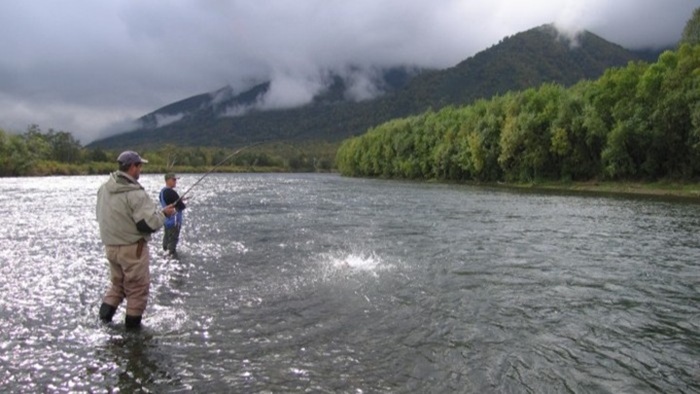Andrey Zdetovetsky, Minister of Fisheries of the Kamchatka Territory, and Dmitry Andrusenko, Chairman of the Kamchatka Salmon Amateur Fishing Association, hosted a live broadcast on the Russian VK social network. Most of the broadcast, which lasted about half an hour, touched upon Sakhalin’s experience in amateur fishing and the possibility of its use in Kamchatka. Recall that in the Sakhalin region, amateur fishermen were allowed to catch five specimens of pink salmon per day for free. Many would like to extend this practice to Kamchatka.

Andrey Zdetovetsky explained why this is not allowed in the Kamchatka Territory. According to him, since the moment when salmon fishing was allowed on Sakhalin (that is, for 12 years), this resource has been seriously undermined there. Previously, salmon fishing in the Sakhalin region was comparable to that in Kamchatka, but now Sakhalin has lagged far behind. Allowing free fishing means giving more opportunities for poaching, the minister believes.
“If we implement the Sakhalin experience, it turns out that from now on you can be anywhere in the Kamchatka Territory with fish without documents confirming the legality of its extraction. It’s a risky decision,” said Andrei Zdetovetsky.
He noted that the cost of permits for pink salmon fishing in the Kamchatka Territory is quite low – about 500 rubles for 20 pink salmon (25 rubles per copy). A fisherman who buys a ticket spends much more on refueling his car, buying a boat and gear.
Dmitry Andrusenko, in turn, stressed that we are not talking about uncontrolled fishing. There are also daily allowances for free fishing. He recalled that the fishing community of Kamchatka offered, as an experiment, to provide free fishing trips for three pink salmon per day at sea fishing sites through the portal of Public Services in order to study the demand for such a service.
According to him, amateur fishermen are outraged not by the cost of the trip, but by the very need to buy the right to fish. By law, a fishing permit is a contract for the provision of paid services. But the fisherman does not receive any services. In addition, a ticket is not a guarantee that there will definitely be a catch. It’s more like a lottery ticket.
“Fishermen are not satisfied that the user of the fishing site decides for himself at what price to sell vouchers. Although he acquires the right to use aquatic biological resources at fixed collection rates. We propose to set a maximum price for travel packages at the legislative level in order to eliminate speculation,” Dmitry Andrusenko said.
The participants of the live broadcast also discussed last year’s study by the Kamchatka Salmon Association of fishing tourism on the Bolshoy River.
“71 companies sell fishing tours on a large scale. Last summer, we counted 32 tourist camps and fishing bases on this river that do not own fishing grounds. According to our calculations, they serve about 600 tourists per day or almost 9 thousand people per month. If we take the minimum catch of 1 kg per person, we will get a significant amount. Moreover, the main press falls on the most vulnerable species – chinook. Such a load is not comparable with the amount of this resource and the number of tours sold. We risk getting IUU fishing in amateur fishing,” Dmitry Andrusenko said. (IUU fishing is illegal, unreported and unregulated fishing).
At the same time, the new requirements impose significant social responsibility on the users of fishing grounds, and the owners of fishing bases and camps are not responsible to anyone.
Concluding the live broadcast, Andrey Zdetovetsky and Dmitry Andrusenko agreed to hold another round table on the topic of amateur fishing this spring in order to discuss these issues in more detail with the participation of all interested parties.
“The Fisherman of Kamchatka”